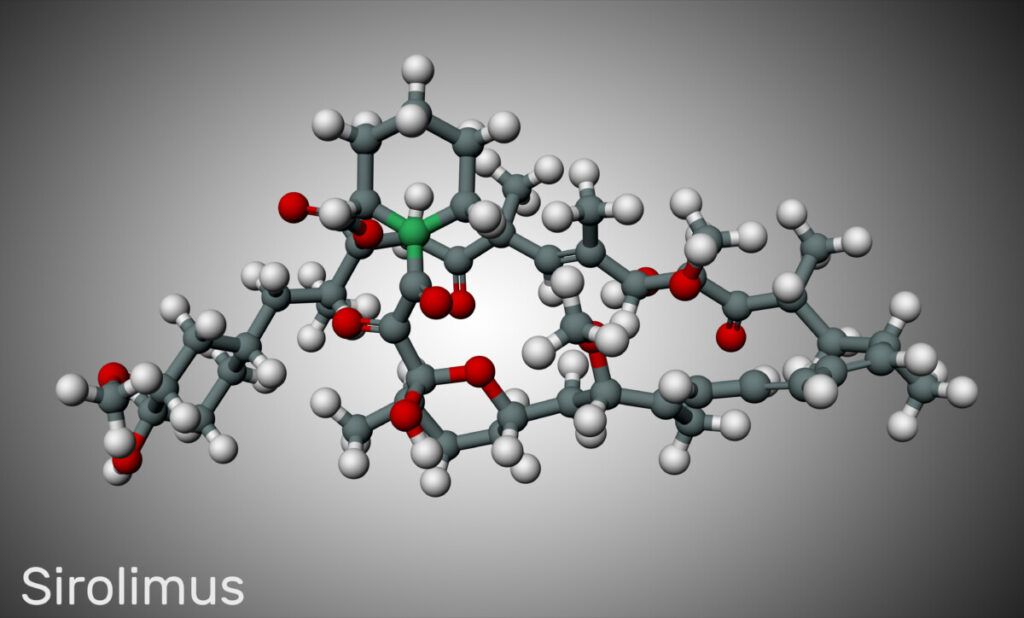Rapamycin is a fascinating drug, and its effects are still being investigated within the medical community. However, what is Rapamycin, and what does it do?
Rapamycin, also known as Sirolimus or Rapamune, is an immunosuppressant drug. Its primary purpose is to inhibit mTOR. It is used to treat several age-related diseases and suppress aging. It has also shown a lot of potential in the prevention and treatment of cancerous tumors.
Rapamycin can do many things, but few people take it. To find out more about Rapamycin’s effects and how it works, read below.
Background
Rapamycin was discovered over thirty years ago from soil samples on the island of Rapa Nui (AKA Easter Island). The name of this island is how the drug got its name.
It was originally used for anti-fungal treatment, but it has proven itself to be very versatile due to its immunosuppressive abilities. More effects and treatment uses of rapamycin have been discovered, and there are still tests being run to find more uses for the drug.
Rapamycin is a prescription drug, so it is only available for the treatment of diseases. Tests are being conducted about its impact on longevity and cancer treatment. Media outlets are asking whether or not it is a potential anti-aging option. The answer is that scientists are not entirely sure. It has been shown to have positive effects on longevity and age-related illnesses.
Mechanism of Action

Rapamycin suppresses the mammalian target of rapamycin (mTOR). mTOR controls cell growth and metabolism. It is very important to muscle growth, but too much mTOR activity can have negative impacts on autophagy. Autophagy is how the body clears out damaged or old cells to make way for newer cells; mTOR pathways will sometimes shut this process down for a little while to preserve energy.
mTOR is also a primary component of the aging process, and it is activated by nutrients and insulin.
Rapamycin does not completely stop mTOR. It just inhibits the pathways a little bit to slow down the aging process, which can have impacts on age-related diseases such as cancer and type 2 diabetes.
Rapamycin has been seen to treat a variety of diseases because of mTOR inhibiting and immunosuppressive properties.
Where Can You Buy Rapamycin?
Rapamycin is available at most pharmacies. It requires a prescription to purchase though, so you can’t just waltz in and buy some.
It is primarily prescribed for people with kidney transplants. It is available as a tablet or in liquid form. Pfizer manufactures it as Rapamune, and it is also sold in a generic form as Sirolimus. It can even be ordered and paid for online, though a prescription is still required for you to buy it.
Follow the directions on the container about administration and dosage. Keep rapamycin in its container and out of reach of children. Store at room temperature, away from light, heat, and moisture. Liquid medication should be kept refrigerated and should be disposed of if it has been open longer than a month. Dispose of medicine through a medicine take-back program. Do not let anyone else take your medication. (Source)
What Conditions Does It Treat?
Rapamycin has a lot of effects. It treats a variety of diseases. It treats some of them by inhibiting the mTOR pathways. These are usually age-related diseases such as cancer or diabetes. Some of them are treated by rapamycin’s immunosuppressive properties.
Rapamycin is used to treat a kidney disorder called Nephrotic Syndrome, a disease that causes the body to pass too much protein in urine. It is caused by damage to blood vessels in the kidneys. Rapamycin is recommended when steroids do not help the patient get better.
It is also used to prevent the rejection of organ transplants. It is combined with other drugs to decrease the immunity that causes the rejection of transplants by suppressing the immune system. Rapamycin needs to be balanced with other drugs to undercut the immunosuppression to help the patient avoid infection. This is what rapamycin is typically used and prescribed for.
Rapamycin is also used for longevity therapy. This is what it is most commonly known for, and there is a lot of speculation in the media about its long-term effects on aging. Media outlets are wondering if it is the next anti-aging miracle drug. It is known to improve metabolism and prevent age-related diseases such as cancer, heart disease, and dementia.
It also has a positive effect on autophagy (the elimination of wastes) and cell growth. Overactivation of mTOR can cause insulin resistance, so taking rapamycin can help with the treatment of diabetes. The exact impacts of rapamycin on the longevity of humans have not been confirmed yet, but it has been seen to have some positive impacts on metabolism and age-related diseases.
Rapamycin can also be used to treat lymphangioleiomyomatosis (LAM), a rare lung disease. This disease mostly affects women of childbearing age, and it involves the development of cysts in the lungs that impair breathing. When administered early, rapamycin can preserve lung function.
Rapamycin can also be used to treat psoriasis. Psoriasis is an inflammatory disease characterized by itching and raised red patches, often on the knees, elbows, and scalp. It is a chronic disease with no cure. Rapamycin can be used to treat it by inhibiting the mTOR pathways, which decreases methylation levels.
The effects of rapamycin on tuberous sclerosis (TSC) are still being studied. Tuberous sclerosis is a genetic disorder in which benign tumors develop. It has several side effects such as epilepsy, kidney problems, and even cognitive disabilities. In a study of the effects of rapamycin on TSC, positive effects were seen in seizure control, though the effects declined after the second year of treatment. Tests are still being run to decide whether or not rapamycin is an effective way to treat TSC.
Who Takes It?
Rapamycin is still only available by prescription, and therefore only to those with diseases that can be treated by rapamycin. Availability of the drug might open up, and then it could be the next big anti-aging fad. Keep an eye on this drug, and you might see some celebrity use over the next few years. If rapamycin is seen to affect longevity, you can be sure to see widespread use and an explosion of popularity.
Who May Want to Take Rapamycin?
People with kidney transplants, Nephrotic Syndrome, cancer, diabetes, LAM, or psoriasis could consider taking rapamycin. As more studies are done on the drug, it may become available over the next few years to those wanting a piece of its anti-aging effects. For now, it is only available by prescription.
Who Shouldn’t Take It?
Rapamycin is an immunosuppressant, which means it weakens the immune system and makes it harder to fight off infections. People with a high risk of infection should not take rapamycin. Rapamycin needs to be balanced with other drugs to counteract the suppression of the immune system.
The effects of rapamycin on pregnancy have not been studied extensively, though there have been some instances in which rapamycin prevented tuberous sclerosis (TSC) manifestations in pregnant women. If you are pregnant, planning on becoming pregnant, or breastfeeding, talk to a doctor before taking rapamycin.
If you are prescribed rapamycin, make sure your doctor knows which medications you are taking. The reactions between rapamycin and other drugs and supplements have not been fully studied, so there may be some dangerous, unintended side effects.
Since you need a prescription for rapamycin, you will need to talk to a doctor before taking it. Make sure that your doctor has all of the information they may need about your situation and other medications that you take.
Common Side Effects

Common side effects include diarrhea, constipation, nausea, vomiting, stomach pain, joint pain, shaking, acne, skin rash, headache, or trouble sleeping. (Source)
The more serious side effects include:
- Muscle pain/cramps
- Bone pain
- Increased thirst or hunger
- Frequent urination
- Vision changes
- Hearing problems
- Unusual tiredness or weakness
- Fast/slow/irregular heartbeat
- Easy bruising or bleeding
- Mental/mood changes
- Swelling in ankles or feet
- Severe headache, dizziness
- Stomach or abdominal pain
- Missed/heavy/painful periods.
Make sure to talk to a doctor if you have any of these side effects.
How Much Does It Cost?
Depending on the pharmacy, 30 tablets of rapamycin costs around $500. The liquid form is usually more expensive (around $1,000). You can get the brand name Rapamune or the generic Sirolimus.
There are a few ways to get lower prices on medications. Make sure to compare the prices of multiple pharmacies and look online for coupons. For some medications, you can ask for a generic form instead of the brand name. Do some research to decide how much money you can save on your medications.
Most Important Research Papers
Here are a few research papers to look at about rapamycin.
Rapamycin for longevity: opinion article
Rapamycin: an anti-cancer immunosuppressant
Rapamycin: one drug, many effects
Should Healthy People Take Rapamycin?
The medical community has mixed responses to this question. Some believe that healthy people taking rapamycin will increase longevity. Others believe that, while helping sick people, the immunosuppressant properties make it too dangerous for healthy people to consume.
Because of this controversy, rapamycin is only available with a prescription, so healthy people can’t take rapamycin at this time. As more research is being done on the drug, more information about its effects on the healthy and unhealthy is being discovered. It may become more available as time goes on. Consult with a doctor and do a lot of research before deciding to take rapamycin.
Does Rapamycin Prevent Cancer?

Rapamycin has been seen to have anti-tumor properties. It slows down the growth of tumors. It is prescribed for common (age-related) cancers. mTOR is involved in the growth of tumors, so inhibiting it with rapamycin can slow down the process. Rapamycin does not kill cells but rather slows down their growth.
Rapamycin can also prevent tumors. It was seen to decrease the progression of lung tumors caused by smoking, breast cancer, and skin tumors. Rapamycin cannot stop the growth of tumors altogether, but it can slow the growth, decrease your likelihood of getting a tumor, and help manage cancer if it does show up.
Rapamycin may be preventing cancer indirectly because of the targeting of anti-aging. Cancer is an age-related disease, many types of which occur later in life. Rapamycin’s aging suppression prevents cancer and other age-related diseases. Scientists are unsure whether the anti-aging effects are the source of cancer treatment and prevention or if it is the other way around, meaning the treatment or prevention of cancer is what is having such positive anti-aging effects. Both cancer and aging are activated by the mTOR pathway, which is targeted by rapamycin, so it is difficult to tell. (Source)
Rapamycin is not a cure or an immunization. It cannot completely prevent or stop cancer altogether. However, like many other medications, it has properties that can slow the growth of cancer and help to fight it. It is more effective in fighting some types of cancer (particularly age-related types of cancer like breast, prostate, lung, and colon cancer).
Do People Who Take Rapamycin Live Longer than Others?
Human testing for longevity effects of rapamycin has not occurred, and the life spans of humans make it almost impossible for effective studies to take place. However, the drug effectively increased the lifespans of mice. A 13% lifespan increase has been seen in mice treated with rapamycin.
Some early tests have been conducted on pet dogs. This is because pet dogs have similar environments and risk factors to their human owners. The tests have shown that many of the same effects on the mice have been shown in dogs and that the small doses of rapamycin had no side effects. More testing is taking place, and, hopefully, more information will be forthcoming.
More testing will need to be done before the effects of rapamycin on the longevity of humans can be confirmed. Make sure to look into the research and science behind sources that tell you the kind of effects that rapamycin has on longevity. Many media outlets are asking whether or not rapamycin could be a new anti-aging solution. Unfortunately, science does not have all of the answers about that yet. Only time will tell if rapamycin will have a significant, long-term effect on longevity.
